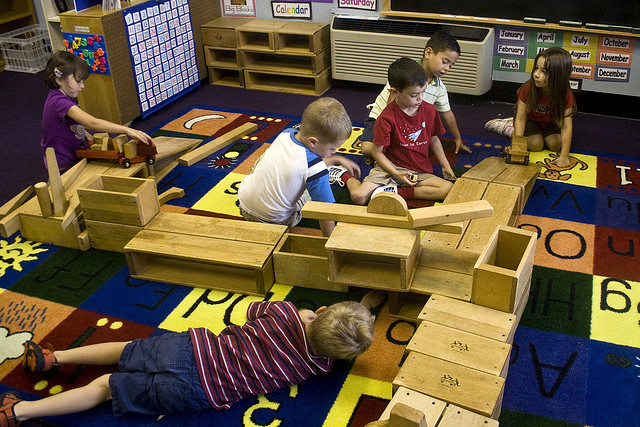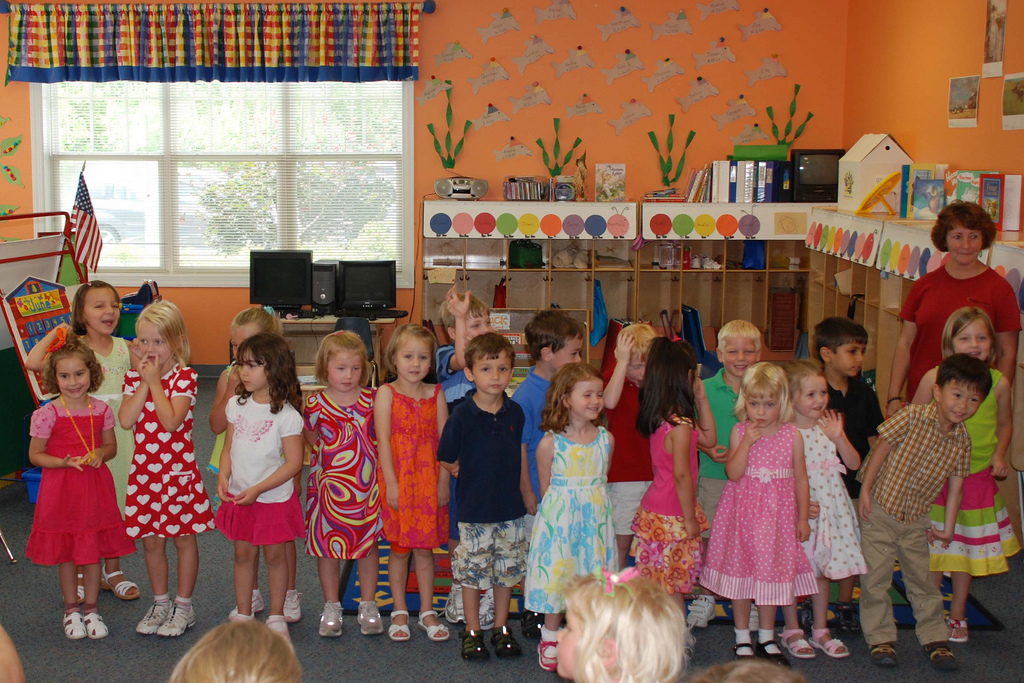A few weeks ago, I was at a training for my job. I am an early childhood educator; more specifically, I teach preschool kids in a classroom designed to reach at-risk children. As we spoke of ways to reach children at all levels of development and to support them in their learning, the training facilitator shared some information that was new to me. “Oh, by the way,” she said to all of us gathered there in the hotel conference room, “there is a big push toward standardized testing for preschool kids happening right now”. Wait, what?
I am well aware of the pressure and strain K-12 teachers are feeling as they see more and more classroom time going toward testing and preparing for testing. With the new Common Core State Standards being implemented, there are additional pressures to keep up with changing expectations without letting test scores fall. A few friends have shared the resignation letter a veteran kindergarten teacher submitted recently, lamenting the evolution our educational system has undergone. Still, it hasn’t ever hit quite so close to home before.
As our facilitator went on to explain, Sandy Kress is one of the forces pushing for this standardized testing at the preschool level. Kress, architect of No Child Left Behind, is an education lobbyist whose antics are so repugnant the Texas legislature made it illegal for him or any other testing lobbyist to make campaign contributions in the state. Fun fact: registered sex offenders can give politicians money in Texas, but Sandy Kress cannot. He’s that bad. It seems the Department of Education has expanded its Race to the Top endeavor to develop early childhood programming. One of the requirements for getting a piece of the $500 million pie: the early childhood programs must “develop and administer kindergarten-readiness tests”.
This “Race to the Top” is more appropriate for kids.
Enter Amplify, the company for whom Kress is shilling. Amplify has come up with a preschool standardized assessment called C-PALLS, in which a teacher tests all of his/her preschool students using a tablet or similar device. The testing attempts to measure various skills (literacy, math, etc.) by asking each child the same series of questions and clicking on the answer they choose. All questioning must be identical so as to track the scores and aggregate them for reporting purposes. With just a few questions and keystrokes, we can line up all of the preschool children in the country on a continuum and figure out which teachers/programs are good, and which are bad, based on the results. The tagline for this program is, “The earlier, the better.” Sounds good, right? Wrong.
Education reporter Melanie Smollin asks the question, “Is standardized testing for preschoolers a good idea?” Short answer–No. It’s “madness”. Her article points out that the U.S. already tests kids more than other industrialized nations, yet our students still score lower on international assessments. It would seem testing more isn’t generating better results. Washington Post columnist Valerie Strauss points out the flaws of using standardized tests on four year olds. It simply is not developmentally appropriate; she cites the example of a preschooler who tested abysmally because she wasn’t in the mood to answer questions on the day of the test. It’s one thing to try and reason with a middle school student on the importance of trying his best; it’s a whole other issue to try and get a four year old in the middle of a tantrum to understand why she needs to stop hiding under the table and come point to some pictures on a tablet that start with the same sound, and then to use that data as an indicator of the child’s proficiency.
Don’t get me wrong; I understand that those holding the purse strings would like to see a return on their investment. A Twitter friend of mine from Texas recently told me that if his tax dollars are going to fund early childhood education, he thinks our programs must be held accountable. The question then becomes, what do you evaluate, and how? Is everything we do in the course of a year supposed to align neatly with a 20-question assessment a preschooler can take simply by tapping on a tablet screen? As I mentioned, I am an early childhood teacher, and over the years I have taught in five different states and worked with kids of all backgrounds. I’ve taught children dealing with issues including homelessness, chronic lice infestation, physical abuse, emotional abuse, sexual abuse, and neglect. I’ve had kids with single parents struggling to make ends meet, with parents battling substance abuse issues going in and out of jail and rehab–leaving the kids to be shuffled in and out of other homes until their parents get them back, with parents out of the picture entirely, leaving the kids to grandparents, foster care or adoptive placement. I’ve had kids that I have literally had to teach not to eat things like their tights, or tape, or craft supplies in the classroom, because they once lived in homes where food was so scarce that CPS workers found them eating chunks of drywall.
These kids NEED preschool. They need a place to come every day that is warm and bright, where they get breakfast, lunch and a snack, and have a calm, quiet rest time where they know they are safe from bugs or rodents or inappropriate touches. They need a place with friends who will laugh and sing and jump and run and play with them, a place where they feel loved and accepted. How on earth do we develop an assessment that evaluates all of the things we do each day beyond reading, writing and arithmetic?
Do we work on skills in preschool? Of course we do. In our school we focus on a variety of areas: math, literacy, cognitive, social-emotional, language, motor, science, social studies and the fine arts, to name a few. Do we have accountability? Yes, we do. We use an online assessment program that allows us to enter anecdotal notes/pictures/videos of our students, where we can rate them on a continuum based on what we see each day. This is not a “Check A, B or C” kind of assessment. This is done daily, with results tracked over time, based on things the kids are doing naturally within the classroom, rather than a forced assessment that happens on one or two days of the year, whether or not the kids are in a testing mood. This progress monitoring is sent to the Department of Education three times a year, so they are seeing our results-and not in some contrived way. Why can’t this be enough? Standardized testing has no place in the early childhood classroom, because it isn’t developmentally appropriate, even if the Department of Education feels otherwise.



